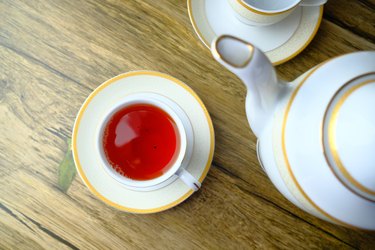
When you're feeling sick, speeding up the recovery process is critical. For some, over-the-counter medicines such as antihistamines are the answer, while others may reach for the best tea when sick. Regardless of what is ailing you, staying hydrated and getting symptom relief is essential.
Best Tea When Sick
Video of the Day
While there is no one best tea to drink when you have a cold, finding a herbal tea that soothes your throat, helps clear your sinuses and tastes good, is a great place to start. Teas such as lemon, elderberry, echinacea, and chamomile may help warm your body and relieve some of the symptoms, but Monica Auslander Moreno, MS, RD, LD/N, nutrition consultant for RSP Nutrition, says that unfortunately, no amount of tea can cure a cold.
Video of the Day
"Staying hydrated is definitely helpful for illness," Moreno tells LIVESTRONG.com. Plus, she also points out that there may be some small antimicrobial and antiviral properties to certain additions like oregano, ginger, turmeric, garlic and honey.
If you like a hint of sweetness in your tea, the best tea for a cold and cough might be a herbal tea with a spoonful of honey. Moreno points out that honey has been clinically shown to soothe sore throats, so adding it to a tea would be very welcome for symptoms associated with a sore throat. Honey can also have cough suppressing properties, so she recommends adding it to a warm cup of tea.
When your stomach is queasy, a cup of warm ginger tea might be just what you need. "Ginger tea has been shown to have antiemetic properties," explains Moreno. An antiemetic is a drug that helps ease the symptoms of nausea and vomiting. It's often used during chemotherapy and for pregnant women battling morning sickness.
A March 2016 study published in Integrative Medicine Insights pointed out that the best available evidence demonstrates that ginger is an effective and inexpensive treatment for nausea and vomiting. However, this study looked mostly at high doses of ginger, so the amount of ginger in a tea would make a significant difference in the effects it has on reducing nausea and vomiting.
Importance of Staying Hydrated
Your body needs water every day to maintain good health. There are several theories as to how much water you should drink in a day, but the actual amount really comes down to your individual needs such as your health, activity level and where you live, explains the Mayo Clinic.
That said, they do cite the National Academies of Sciences, Engineering, and Medicine's recommendations which state that men should get about 15.5 cups or 3.7 liters of fluids per day and women about 11.5 cups or 2.7 liters per day.
The amount of water you need to drink for optimum health may fluctuate depending on a variety of factors such as exercising in the heat or dealing with an illness. When you're sick and have a fever or you're experiencing vomiting or diarrhea, your body loses fluids. Drinking water when sick can help replace the lost fluids and keep you hydrated.
Read more: How Can I Tell When My Body Is Hydrated?
Drinking plenty of fluids will help keep your nose and throat moist, according to the Cleveland Clinic. Drinking water when sick may also help to loosen mucus. Johns Hopkins Medicine recommends warm liquids such as tea, warm water with lemon or broth when sick.
Not only do warm fluids prevent dehydration, but they are also effective at easing congestion and soothing a sore throat. Additionally, Johns Hopkins Medicine says to avoid alcohol, coffee and sugary drinks since they can be dehydrating.
- The Cleveland Clinic: "Common Cold Management and Treatment"
- Johns Hopkins Medicine: "The Do's and Don'ts of Easing Cold Symptoms"
- The Mayo Clinic: "Water: How Much Should You Drink Every Day?"
- Integrative Medicine Insights: "The Effectiveness of Ginger in the Prevention of Nausea and Vomiting during Pregnancy and Chemotherapy"
- The Journal of Family Practice: "A Spoonful of Honey Helps a Coughing Child Sleep"
- Essence Nutrition, Monica Auslander Moreno: "Personal Interview"